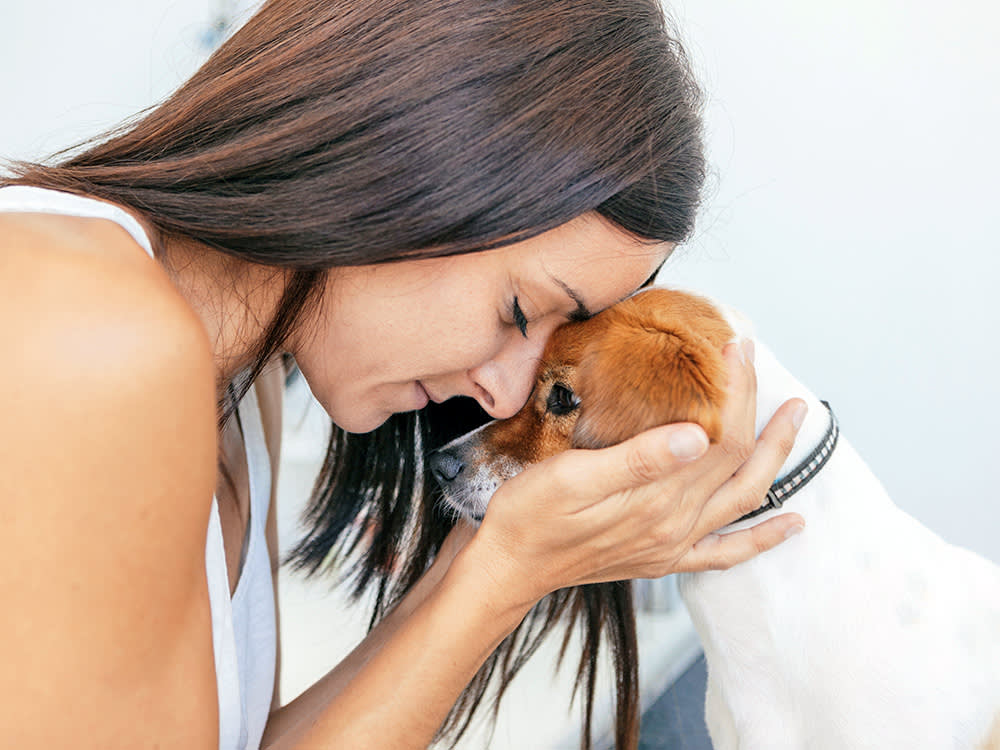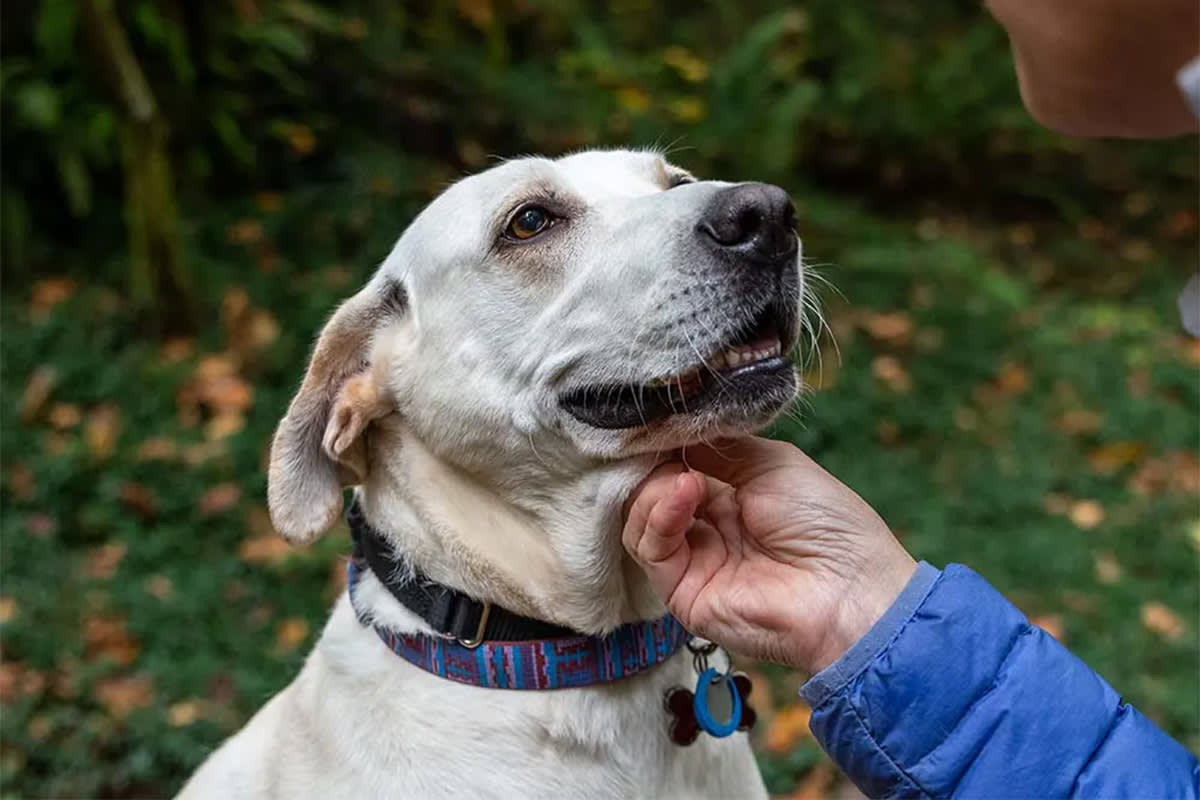My Vet Told Me My Dog Only Had a Few Days to Live—And Now, She’s Thriving
Getting a second opinion saved my pup’s life.

Share Article
A little over a month ago, a vet told me that my 15-year-old Jack Russell Terrier, Bowie, was at the “end of her life” and that she only had a few days to live. She said it would not be worth taking her in for fluids and potentially life-saving treatment. Right now, she is sitting at my side after running all over the house with the zoomies. Needless to say, I didn’t listen to that vet, and I got a second opinion.
It turned out that she was severely dehydrated and had gastrointestinal upset that was making all of her other organs inflamed. While she is an older dog, the issue she was dealing with was acute, and it turned out to be easily treatable.
It is always painful and traumatic to be told that your dog might not make it, but in this case I felt as if the vet had simply given up on my otherwise healthy, happy dog because of her age. After being treated for dehydration, she is thriving. It scares me to think what would have happened had I listened to the first vet and brought her home without those life-saving fluids and electrolytes. It is likely that she would have been right and that I would no longer have Bowie here with me now.
This happens more often than you might think.
My experience is not unique. After I posted about it on Instagram, many people reached out to tell me that they had either experienced similar treatment or knew someone who had. One person, Reb, told me that after noticing that her dog Bella was disinterested in walks, she took her to the vet. Despite Bella only being nine years old and otherwise healthy, the vet told her that it was “just aging” and opted not to investigate further. They have decided to pursue a second opinion.

Lauren Hood, the founder of the Alaqua Animal Refugeopens in new tab in Freeport, Florida, says that she has heard about this happening many times. Sometimes, it may be a subtle comment like “there’s not much we can do,” while other times, parents are told that their dog is too old to justify treatment. This is particularly hard to hear when, as in my case, the pet is present and engaged.
Hood says that she has seen senior dogs surrendered to county shelters after receiving this kind of news, with the expectation that the shelter will handle euthanasia. “It’s heartbreaking, and it often stems from a lack of support and compassion for both the pet and the owner during what can be an emotional and overwhelming time,” Hood says. Many of those dogs, when rescued, have lived for several more years.
It‘s important to look beyond a dog’s age.
Hood believes that this can come from a clinical mindset that tends to focus more on averages and life expectancy than the individual animal. Some vets, though of course not all, look at age and prognosis as a cutoff, rather than evaluating the whole picture.
In my case, the vet explicitly told me that “15 is life expectancy” for Bowie’s breed, despite the fact that she was running around her favorite park just a day prior. “Every dog is different, and at Alaqua, we’ve seen countless senior animals bounce back with the right care and go on to enjoy many more happy, comfortable years,” Hood adds.
The fact is that “senior” just doesn’t mean any one thing. Dogs’ lifespans vary drastically, particularly from breed to breed. While some larger pure breeds might be lucky to reach 10 years old, some small dogs can live much longer, like Chihuahuas, who often live past 20. With increasing quality of care, medication and other support, dogs can live longer and longer, and life expectancy just does not mean what it used to.
While senior dogs can struggle to get the support and love that they need, the good news is that seniors are actually a growing part of the pet population. In fact, over the past decade, the number of U.S. households with a dog older than seven years of age has increasedopens in new tab from 42 percent to 52 percent. Along with that growing population is an increased need for understanding around what older dogs need and what they are capable of with the right care. Loving a senior dog can be painful, especially when you have to grieve their loss. But caring for Bowie is an honor and a joy that I wouldn’t trade for anything.
Denise Fleck is the executive director of The Grey Muzzle Organizationopens in new tab, a 501(c)(3) non-profit organization that provides grant funding to shelters and rescues nationwide specifically to help senior dogs. She says that, while she has been blessed to find veterinarians who are compassionate and aligned with her feelings about her dogs, she believes it is perfectly acceptable to get a new vet or seek a second opinion if you are worried about your vet’s attitude towards your dog.
Finances are a factor — but are not always a reason to stop care.
Fleck tells me that many vets might foresee the potential financial strain of further treatment and want to dissuade pet parents from spending their money, particularly when outcomes aren’t guaranteed. However, she says that, while we have to consider what is kindest to our pets, there is so much that can be done to help our dogs live longer, healthier lives.
“If 50 is the new 30 for us humans, I feel that translates to our canine family members too. A numerical age does not determine a pet’s lifespan. So much more enters into it and when armed with the right information, I truly feel the pet parent knows what’s best,” Fleck says.
If you find yourself in the same situation that I did, Fleck says that it’s important to ask detailed questions. “Request clear explanations of the diagnosis, treatment options, potential outcomes, and quality of life assessments. Ask if you do X test and get X results, what happens next.”
She also recommends seeking a secondary opinion, such as a veterinary specialist who can provide realistic outcomes: veterinary oncologist, geriatric vet, internal medicine, for example.
Don’t be afraid to advocate for your pet — and ask the right questions.
Hood adds that it is essential to speak up. “Don’t be afraid to advocate for your pet. If something doesn’t feel right, trust your instincts and push for more information. Ask your vet what all of the options are, even the ones they may not initially recommend. Do your own research based on their diagnosis. And if needed, get a second opinion. You have every right to make sure you’re doing what’s best for your animal.”
You are the voice of your pet. They cannot speak and advocate for themselves, so you have to do it. “It’s so important to take a step back, evaluate all the options, and choose the path that feels most humane and aligned with your values,” Hood says.
Sometimes, there truly might not be any more that you can do for your beloved pet. Before making that decision, Fleck says that there are some signs you can look out for when assessing their quality of life. Can your dog eat and drink? Are they going poop and pee normally? Do they enjoy the things they used to, such as interacting with family members, sitting outdoors, playing with a toy? Do they have more good days than bad?
Overall, Fleck says that the treatment should never be worse than the disease or illness itself. Hood adds that it’s essential to look for small, meaningful details. Do they respond to your voice? Can they relax in the sun? Hood says that something in their eyes often tells you when they’re ready, and honoring that moment with love and dignity is one of the most compassionate things we can do.
If it truly is not time yet and you decide to seek a second opinion, Fleck suggests that you request your dog’s full medical records. It is your right, and you need to do what is best. Specialists can often provide answers that your vet cannot, and help you to determine what your pet’s quality of life truly is.
“Trust your instincts,” Hood adds. “You know your dog better than anyone else. Just because they’re older doesn’t mean they’ve lost their will to live or their ability to enjoy life. With a few small changes, like soft bedding, shorter walks, pain management, or easier access to food and water, senior dogs can thrive. They may move slower, but their bond with you is just as strong, and their hearts are just as full. They’ve given us so much. They deserve to be supported and cared for until the very end.”
As Hood says, you know your pet better than anyone, and while your vet is very qualified, you are in the best position to assess your own dog’s quality of life day to day. Always advocate for them, seek a second opinion, and make sure you do what is truly in their best interest. When it comes to their health, you are their champion, and older dogs especially need us to speak up for them as loudly as we can.
By the way, I just got a call from Bowie’s current vet telling me that her bloodwork is perfect.

Marianne Eloise
Marianne Eloise’s work has appeared in The New York Times, The Guardian, The Cut, Vulture, and more. She is also the author of an essay collection Obsessive, Intrusive, Magical Thinkingopens in new tab. She has been going on adventures with her dog Bowie since she was 17.
Related articles
![woman with red hair holds senior Pomeranian dog]()
How to Take Care of a Senior Dog
As dogs age, it’s important to recognize both physical and mental changes they may be experiencing.
![Happy golden retriever dog on a walk with owner in woodsy yellow and orange fall setting with leaves on the dirt trail.]()
Home Remedies for Dog Joint Pain Relief
DIY ways to help your pup cope with the pain.
![Senior mixed breed dog playing with washable snuffle rug for hiding dried treats]()
How to Help Your Bored Senior Dog Spice Up Their Life
Spice Girls reference aside, just because your dog is graying around the eyes doesn’t mean those eyes don’t light up at playtime.
![Man hugging his cute Chihuahua dog.]()
10 Dog Breeds with the Longest Lifespans
Because we all wish our pets could live forever.
![Woman celebrating her yellow lab's birthday.]()
Dog-Age Chart: Calculating Your Dog’s Age in Human Years
The math isn’t as cut and dry as you’d think.
![Young caucasian cheerful blonde girl sitting and hugging her lovely cocker spaniel dog in cafe.]()
10 Longevity Tips From People Whose Pets Have Lived Incredibly Long Lives
Follow these vet-backed tips to help your best bud live a healthy and full life.







